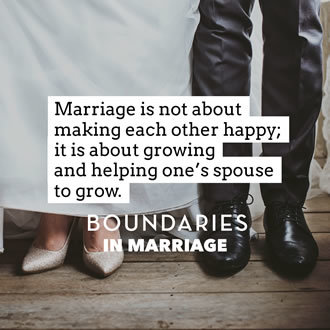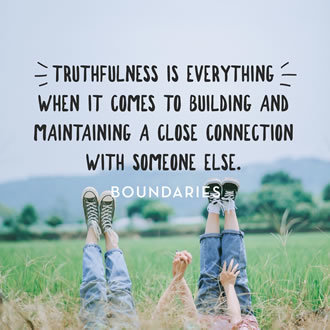Henry Cloud's Blog, page 3
February 21, 2020
How Healthy Confrontation Can Strengthen Your Marriage
 When my wife, Barbi, and I (Dr. Townsend) were first married, we used to have conflicts about conflict. Looking back, it’s kind of funny as I later went on to write a Christian relationship book called Boundaries in Marriage. Imagine watching us have boundary conversations about how bad our marriage boundaries were. Barbi’s approach to conflict was to avoid it. My approach tended to be more blunt. We’d talk about a problem and it wouldn’t go well. One of us would misunderstand, we would pull away from each other, and the problem wouldn’t get solved.
When my wife, Barbi, and I (Dr. Townsend) were first married, we used to have conflicts about conflict. Looking back, it’s kind of funny as I later went on to write a Christian relationship book called Boundaries in Marriage. Imagine watching us have boundary conversations about how bad our marriage boundaries were. Barbi’s approach to conflict was to avoid it. My approach tended to be more blunt. We’d talk about a problem and it wouldn’t go well. One of us would misunderstand, we would pull away from each other, and the problem wouldn’t get solved.
One day, I asked Barbi, “When we argue, I never stop loving you. Is there anything I can do to make this better for you?” She thought a minute and said, “Maybe if you let me know you love me before you confront me, that might help.”
I thought that was a good idea, so I agreed. The next time I wanted to have a talk with her about a concern, I walked in the room and said something like, “Honey, I just want to let you know I really care about you and I hope you feel safe with me.” Then when I brought up the problem, things went better for her and for us.
This method of having successful conversations went on for a while. As time passed, however, something changed. I needed to bring up an issue, so I began with, “Honey, I just want you to know …” Barbi said, “Stop! It’s okay. I know you love me; just get to the problem.”
We had a good laugh about it. Over time, she had begun feeling safe enough not to need reassurance before each conversation. She realized that I love her even in the midst of confrontation, and she was ready to go straight to solving whatever problem needed to be solved.
When God created marriage, he gave us one of his best gifts. He provided a permanent and safe connection for a man and a woman to experience love, joy, meaning, and purpose together. Genesis 2:24 says, “For this reason a man will leave his father and mother and be united to his wife, and they will become one flesh.” God designed marriage to be a whole-person connection. This means that, more than in any other human relationship, every part of you ideally is to connect and cleave to every part of your spouse. The love you share should be complete as you intertwine your lives and emotions around each other.
Because marriage is such a wonderful type of relationship, confrontation within the marital relationship is very important. Who is better qualified to understand and speak to someone about a problem than the person who is living life right next to him? You are intimately involved with him. You see the real person, imperfections and all. His ways and actions affect you; you are not dispassionate about him. More than anyone, a spouse should be able to see what her partner’s true problems are.
Marriage is not about making each other happy; it is about growing and helping one’s spouse to grow. For instance, Ephesians 4:16 says good marriages are a large part of how the body of Christ “grows and builds itself up in love.” Happiness can and does come to a good marriage. Happiness, however, is a byproduct of growth and life. It is not the goal.
Confrontation brings empowerment, which is the ability to make choices and changes in your relationship. God created all of us to be change agents for each other. We have a responsibility to influence the people in our lives to be the best possible people they can be. For instance, 1 Thessalonians 5:11 says, “Therefore encourage one another and build each other up.”
Healthy confrontation helps us grow by making us aware of what we are doing and how our behavior affects others. God uses us to deliver the ingredients of growth to the people in our life. Part of the reason we are with whomever we are with is to provide those ingredients for those people. While most would agree that we can’t make someone change, it is also true that we can do much to encourage change.
As Barbi and I have learned to confront each other lovingly, directly, and effectively, we are often pleased in the change not only in our marriage but also in ourselves. We feel a sense of power that we can make changes and that we have choices. God designed all of us to connect and act, and confrontation helps put the “act” into the connection.
________
If your marriage is struggling or you want to make a great marriage even better, Boundaries in Marriage has the answers. Learn how to:
Transform your relationship into a haven of mutual love, caring, and appreciation.
Protect your marriage from intruders, whether parents, affairs, or addictions.
Handle conflict effectively without losing your voice in the relationship.
Develop a sense of closeness and respect that you’ve never felt before.
Click here to learn more.
 Get The 10 Laws of Boundaries eBook when you subscribe to the Boundaries Weekly email newsletter. Learn More
Get The 10 Laws of Boundaries eBook when you subscribe to the Boundaries Weekly email newsletter. Learn More
The post How Healthy Confrontation Can Strengthen Your Marriage appeared first on Boundaries Books.
February 19, 2020
What to Do When Trust Is Broken
 Several years ago, I (Dr. Cloud) went to a conference on working with character disorders, and the instructor was giving a list of priorities to psychologists who treat them. “Character disorder” is a catch-all term, but one way of defining it is “people who do not take ownership and responsibility for their lives.”
Several years ago, I (Dr. Cloud) went to a conference on working with character disorders, and the instructor was giving a list of priorities to psychologists who treat them. “Character disorder” is a catch-all term, but one way of defining it is “people who do not take ownership and responsibility for their lives.”
I will never forget what the instructor said about the number-one priority—other than protecting your personal safety—in treating character disorders. He said, “As soon as there is any kind of deception, stop everything.” If you are trying to help someone and he is lying to you in some way, there is no relationship. The whole thing is a farce, and you should not go any further in trying to help the person until you settle the issue of deception. There are no other issues at that point except that one.
Trust is everything in a helping relationship, and when it is broken, it becomes the only issue to work on. Either fix that or end the relationship. Where there is deception, there is no relationship.
It was wise training and good counsel from a very experienced leader in the field. Thirty-five years of practice had taught him through experience that where there is deception, there is no relationship. Truthfulness is everything when it comes to building and maintaining a close connection with someone else.
We believe that truthfulness is the basis for almost everything. You should have an absolute zero-tolerance policy when it comes to deception. Lying should have no place in your life. Listen to King David’s tough stance on lying: “No one who practices deceit will dwell in my house; no one who speaks falsely will stand in my presence” (Psalm 101:7).
Clear, straightforward, and rigid. Do not tolerate lying, period. That does not mean that if you are lied to once or deceived once that the relationship has to be over. Especially in the area of the person not being totally clear and direct about how he or she feels about certain preferences, or what his or her desires are. Probably every human being is growing in his or her ability to be direct and completely vulnerable with feelings and deeper things of the heart. People grow in that ability. None of us is perfect and secure enough to never use the fig leaf.
But don’t tolerate deception or lying when it happens.
________
If you’re experiencing deception or struggling to trust someone in a relationship, find practical solutions in The New York Times bestselling book, Boundaries.
 Get The 10 Laws of Boundaries eBook when you subscribe to the Boundaries Weekly email newsletter. Learn More
Get The 10 Laws of Boundaries eBook when you subscribe to the Boundaries Weekly email newsletter. Learn More
The post What to Do When Trust Is Broken appeared first on Boundaries Books.
February 14, 2020
Two Reasons Why You Should Say No to Physical Intimacy in Dating
 If you have hung around the church for very long, you have probably heard that God wants people to reserve sex for marriage. If you haven’t and that is news to you, then we can understand the shock you might be feeling. For many people, both inside and outside of the church, it does not make sense. If sex feels so good, and is good for the relationship, and both people are consenting, then what is the problem?
If you have hung around the church for very long, you have probably heard that God wants people to reserve sex for marriage. If you haven’t and that is news to you, then we can understand the shock you might be feeling. For many people, both inside and outside of the church, it does not make sense. If sex feels so good, and is good for the relationship, and both people are consenting, then what is the problem?
Consider this viewpoint: When someone can say no to sex while dating, their behavior is a sign that he or she is capable of delaying gratification and exhibiting self-control, which are two prerequisites of the ability to love. If someone cannot delay gratification and control himself or herself in this area, what makes you think that they can delay their own gratification in other areas of sacrifice? What is going to curb the “I want what I want now” mentality in the rest of life? If someone is able to respect the limit of hearing no for sex, then that is a character sign of someone who can say no to their own desires and hungers in order to serve a higher purpose, or to love another person.
You fall in love with a person and think about making a real, committed relationship with him or her. Naturally, that is going to mean some sacrifice down the road. You are going to want to be with a person who can deny himself or herself for the sake of your relationship in many areas. Think of the areas of sacrifice that a relationship takes. There are sacrifices of time, when you might want to spend time on your favorite hobby, and yet the family needs you. There are sacrifices of money. One person may want to buy a new car, and yet the family needs money for the home. There are sacrifices of getting one’s way. One person may want to go to one place for dinner and the others want something different.
Most importantly, there is the sacrifice that it takes to work out conflict. One person is hurt and wants to strike back in anger or hurt, yet to reconcile, the ability to put one’s own desires aside for the sake of the relationship is necessary. If someone does not have self-control and delay of gratification in pleasure, can they delay the gratification of getting his or her own way in conflict?
Think about it. Wouldn’t you want to be with a person who can hear and respect the “no” of others? Having a boundary in sex while you are dating is a very important test to see if the person loves you. We have all heard people refer to the line “If you love me, you will.” In reality, you should say back, “If you love me, you won’t make demands that I do not feel comfortable with.” Love waits and respects, but lust must have what it wants now. Are you being loved, or are you an object of self-serving lust? Saying no is the only way to know.
We cannot overemphasize the value of dating a person who can delay their own gratification. If you are with someone who ultimately has to have what they want when they want it, you are in for a long time of misery. Choose someone who can delay gratification for the sake of you and the relationship. To the extent that he or she says, “I must have what I want now,” you are in trouble. Boundaries with sex are a sure-fire test to know if someone loves you for you.
________
Learn more about how healthy choices grow healthy relationships by reading Boundaries in Dating by New York Times bestselling authors Dr. Henry Cloud and Dr. John Townsend.
 Get The 10 Laws of Boundaries eBook when you subscribe to the Boundaries Weekly email newsletter. Learn More
Get The 10 Laws of Boundaries eBook when you subscribe to the Boundaries Weekly email newsletter. Learn More
The post Two Reasons Why You Should Say No to Physical Intimacy in Dating appeared first on Boundaries Books.
February 6, 2020
Why Church Can Be a Dangerous Place
 I (Henry) got an emergency call, and the office relayed to me that I had a suicidal client. I called Theresa on the phone. She was distraught.
I (Henry) got an emergency call, and the office relayed to me that I had a suicidal client. I called Theresa on the phone. She was distraught.
“Tell me what happened,” I said.
“It’s not going to work,” Theresa replied, sobbing.
“What isn’t going to work?”
“Telling other people about my problems,” she said. “I went to my fellowship group tonight and told them about the depression and the problems with Joey, and they really came down on me for being depressed and for all the other stuff that has been going on.”
“What did they say?”
“Well, they said that I shouldn’t feel that way and that if I was still having all those problems then I probably wasn’t walking with the Lord. I don’t know what to do anymore. I’ve tried all this ‘safe relationship’ stuff, sharing and all that, and now it doesn’t work.”
“What would you say if I told you that you still haven’t found safe relationships?” I asked.
“What do you mean?” Theresa asked. “They are all Christians and in my church.”
“Well, Christian doesn’t automatically mean ‘safe,’ ” I told her. “Safe is defined by helpful. It doesn’t sound like tonight was too helpful.”
“Well, how do you know a helpful relationship?” she asked.
“That’s a good question,” I said. “Let’s talk about that.”
I empathized with Theresa. She had discovered a real truth: the church is not a perfectly safe place. That sounds like it cannot be true, for if anywhere should be safe, the church should be. Every fiber in our being rejects the idea that the one place we think ought to be safe — the house of God — isn’t.
The church is not a totally safe place, and it does not consist of only safe people. As much as we would like for it to be totally safe, the truth is that the church has to be seen the way God describes it. We must, if we are going to have a biblical view of relationships and people, and live the way that God wants us to live, see the church as he describes it. Our faith must be able to square with the reality of life as we find it and with the reality that the Bible describes to us. Let’s look at those two realities.
Theresa was echoing the experience of many people. Anyone who has been in the church for very long has been hurt by people in the church. For in the body of Christ, we find some harsh realities: judgment, pride, self-centeredness, manipulation, abandonment, abuse, control, perfectionism, domination, and every kind of relational sin known to humankind. The walls of the church do not make it safe from sin. In fact, the church by definition is composed of sinners.
To further complicate matters, church by its very nature as a family of God activates our most primitive and dependent longings because we want a perfect family. God designed the church to be our second family, and often we take into the church the same longing for security and love that we take into our families of origin. And for some, as in their original family, the wish is not only disappointed — it can be crushed altogether. What are we to do with that reality?
The one difference is that, as adults entering into the family of God, we have choices about who we are going to trust and get close to. David said in Psalm 101:6 that we can pick the “ones who will minister to [us].” But we are not by nature so discerning. We come into the church feeling and wishing, “Take care of me. I need you. I shouldn’t have to first figure out who is safe and who is not. You should be good and trustworthy.” We feel the longing of Romans 8 that says that we long for and groan for our adoption. We want things to be right. And then they are not.
On the other hand, many of us have felt that the body of Christ has nurtured, loved, and taught us in ways that have radically healed us. Through the acceptance and love of other believers our character has changed, and we have slowly let go of the things that shackle us.
We also hear others testify to that reality. They were destroyed by their families, or the world, and they were saved and healed in their church. Someone — or a group — in the church reached out to them, and their lives were radically changed.
I (Henry) can testify to this. I had dreamed and planned my whole life to play professional golf, from the age of six until I was recruited by a nationally ranked college to play varsity golf. I was beginning to compete on higher and higher levels and doing quite well. I thought my dreams were being realized.
Then catastrophe hit. A tendon problem in my left hand snatched my budding career right out from under me. I could no longer even hold onto a golf club, and there was no cure. I was lost and devastated. The path that I had diligently worked towards for fifteen years, day and night, had hit a dead end. At the same time, I encountered some other significant losses in my life. Things were falling apart. I got seriously depressed.
At first I tried to work my way out of it. I had always been a “don’t ever give up” kind of person, especially in sports. I thought I could lick this problem in the same way, through sheer hard work and willpower. But I got more and more depressed, and nothing was filling the hole inside of me. The depression and lostness continued to build until I decided to drop out of everything to try to sort things out.
I first reached out to God, telling him that I did not even know if he existed, but that if he would show me that he did, I would do what he told me to do. After all, my way wasn’t working.
Less than an hour after I prayed that prayer in a little chapel at Southern Methodist University, my phone rang. A friend I hadn’t talked to in quite some time told me that he and some others were starting a Bible study and that for some strange reason, he thought that he would invite me to come. I told him I would, not quite believing what had just happened.
To make a long story short, the leader of that Bible study and his wife invited me to come live with them for a semester while I sorted things out. Their gift of themselves to me forever changed my life. Their love and teaching touched some very deep parts of me as they led me to the reality of a relationship with God. He had found me, and through the love and acceptance of his body, I was being healed.
So the church can be a healing place, a place where lives are transformed and where powerful love and healing can take place. The body of Christ is still God’s instrument for our healing and restoration (1 Peter 4:10; Ephesians 4:16). So, the question arises and rings in our needy hearts: Is the church safe, or is it dangerous? The answer is, “It is both.” Sometimes we are fortunate to find good relationships, and other times we run into disaster.
The sad thing is that our ideals for the church do not reflect biblical reality, either. We think that the Bible promises a church where we find only safe people. But the Bible says that the church is full of wolves as well as sheep. In the church, we will find both tremendous healing and potentially tremendous hurt. And if we are going to find healing and minimize hurt, we need to make sure that we see the church as God describes it to us. We need to operate according to biblical reality instead of our fantasized wishes, for biblical reality is the one that will fit the experience we find in the real world.
Our experience and the Bible affirm the same thing. The church is full of safe people, unsafe people, and hurtful lingerers. There is no perfect family short of heaven. But there is also no absolute hell full of demons either. And the Bible’s clear message is that we need to be discerning. We need to make informed choices, and we need to be careful. But we also need to avoid becoming pessimistic and learn to recognize the goodness that abounds within the family of God (Matt. 25:34 – 40). If we become skeptics and give in to our fears of bad outcomes, God says that we will lose the little that we have.
So, the long and the short of it is that we have to work to find safe people, using our wisdom, discernment, and character. We gain wisdom and discernment through knowledge and experience. But if our own character problems get in the way of using our knowledge and experience we will make poor choices. We need to make sure that we are facing the weaknesses inside and dealing with them, becoming people of character who can choose other people of character, with a knowledge of what they look like. As we get the log out of our own eye first, we will be able to see clearly.
________
Adapted from Safe People: How to Find Relationships That Are Good for You and Avoid Those That Aren’t by Dr. Henry Cloud and Dr. John Townsend. Learn more about this helpful book.
 Get The 10 Laws of Boundaries eBook when you subscribe to the Boundaries Weekly email newsletter. Learn More
Get The 10 Laws of Boundaries eBook when you subscribe to the Boundaries Weekly email newsletter. Learn More
The post Why Church Can Be a Dangerous Place appeared first on Boundaries Books.
January 31, 2020
The Secret to Changing Your Spouse
 Lynn was weary of Tom’s chronic lateness in coming home from work. Because he owned his own business, he was often delayed at work. It seemed like such a little thing, but as time passed, Tom’s tardiness became a big problem. Lynn would arrange her day to have dinner and the kids ready on time, and she wanted Tom to be home on time as well.
Lynn was weary of Tom’s chronic lateness in coming home from work. Because he owned his own business, he was often delayed at work. It seemed like such a little thing, but as time passed, Tom’s tardiness became a big problem. Lynn would arrange her day to have dinner and the kids ready on time, and she wanted Tom to be home on time as well.
Reminding, nagging, and cajoling Tom had been ineffective. Tom would either defend himself by saying, “You don’t appreciate the work I have to do to put food on the table,” or he would simply deny the problem altogether by saying, “It doesn’t happen that often; you’re overreacting.” Lynn ran out of strategies.
Finally, after thinking through the problem with some wise women friends, Lynn came up with a two-point plan. One night, as the couple climbed into bed, she told Tom, “Sweetheart, I want to apologize to you for my crummy attitude about dinnertime.” Tom almost fell out of bed. He was eager to hear her apology.
“I’ve been a complaining griper whenever you get home,” Lynn continued. “You probably feel you have to toss a few pounds of raw meat in the front door before it’s safe to enter. No wonder you’re late. Who would want to put up with that?”
“You’re right. I really don’t look forward to your resentment,” Tom responded, “and I’m sure it makes me avoid you. The other day, I was going to be ten minutes late. When I thought about facing your wrath, I figured I might as well make it thirty minutes, since I knew you’d be angry anyway. So, I ran few errands on the way home.”
Lynn nodded. “I’m going to try to be less angry, and more caring and approachable, even when you’re late. I may not do it well, and I’ll need your help here, but I really don’t want to be a shrew. Also, it’s not just my attitude that I’ll be changing. My actions will be changing, too. I love you, and I want you to be with me and the kids for dinner. But, if you can’t get here on time, I will have your dinner put away in the fridge. You can reheat it yourself whenever you get in.”
Tom didn’t like this last part. “Lynn, you know I hate to make my own dinner! After a ten-hour day, I want to sit down to a prepared meal.”
“I know you do, and I want that for you, too. But it won’t happen until you can rearrange things to get here when the rest of us eat.”
The next few days Tom ate a lot of microwaved dinners from Tupperware containers. Finally, he structured the end of his day to get home on time, and Lynn’s important family time became a reality. When Lynn asked Tom why he had changed, he said, “I guess it was your two-point plan. First, you were a lot nicer to me. I felt more like coming home. And second, I just hate reheating dinner.”
Lynn solved a small but chronic marriage problem by making an important shift in her attitude. She stopped trying to change Tom, and she started making changes in herself. Lynn moved from seeing the problem as Tom’s lateness to seeing it as her unhappiness with Tom’s lateness. This opened the door to things she could control. When you cease to blame your spouse and own the problem as yours, you are then empowered to make changes to solve your problem.
To do this, Lynn set a couple of limits on herself. First, she reined in her impulse to attack Tom for his tardiness. This was not easy, as she was clearly right and he was clearly wrong. She would have been justified in confronting him at every infraction.
But, she placed a boundary on her anger, since it wasn’t solving the problem. Second, Lynn set a limit on her enabling of Tom. She realized that she was making it easier for him to be irresponsible, so she said no to her desire to protect him from his dreaded dinner reheating. These two changes made a difference for both partners.
You cannot make your spouse grow up—that is between him and God. But, you can make it easier for him to experience the love and limits he needs. When he faces the consequences of his immaturity, he stands a better chance of changing than if he faces your nagging and hounding. Become truthful, not controlling.
________
If your marriage is struggling or you want to make a great marriage even better, Boundaries in Marriage has the answers. Learn More
 Get The 10 Laws of Boundaries eBook when you subscribe to the Boundaries Weekly email newsletter. Learn More
Get The 10 Laws of Boundaries eBook when you subscribe to the Boundaries Weekly email newsletter. Learn More
The post The Secret to Changing Your Spouse appeared first on Boundaries Books.
January 27, 2020
The Cure for the Disease of Entitlement
 Entitlement is the belief that I am exempt from responsibility and I am owed special treatment. Entitlement is: The man who thinks he is above all the rules. The woman who feels mistreated and needs others to make it up to her.
Entitlement is the belief that I am exempt from responsibility and I am owed special treatment. Entitlement is: The man who thinks he is above all the rules. The woman who feels mistreated and needs others to make it up to her.
I (Dr. Townsend) need you to understand the concept of entitlement thoroughly, so that you can recognize it and help others get past it. It is not always easy to understand. Entitlement is not the person who has needs or struggles that she cannot deal with on her own. She is in need. Chronically ill individuals and disabled veterans often are in great need of help, and we need to help them. Entitlement is the person who is capable of taking care of himself and still expects others to do that for him, because he feels he is owed that. This includes the able-bodied adult child who continues to live with his parents, refusing to work, to contribute to the home’s upkeep, or even to clean up after himself. It can also include the worker who takes advantage of disability benefits after she has recovered.
There is a solution to entitlement, which I call the Hard Way. The Hard Way is the entitlement cure. It is a path of behaviors and attitudes that undo the negative effects of entitlement, whether in ourselves or in others.
Here’s my definition of the Hard Way: The habit of doing what is best, rather than what is comfortable, to achieve a worthwhile outcome.
When you deem something worthwhile, be it a career or financial dream, a great family or marriage or some self-care goal, you have two ways to go about it. Entitlement directs you to give the minimum, find the shortcut, and think only of yourself. The Hard Way takes the opposite tack. This habit focuses on doing whatever is best to reach the good goal, even if it is difficult, uncomfortable, takes longer, and requires more energy.
Does that sound hard? Yes, it does, because yes, it is. It’s hard to wake up early in the morning and work out. It’s hard to get to work on time. It’s hard to spend hours a day inputting data when you are a creative person. It’s hard to think creatively when you are more linear. It’s hard to have difficult conversations, to face down tough challenges, and to do the same actions, over and over again, that are required to achieve success. As the saying goes, it’s called work for a reason. But it pays off, just as good sowing leads to good reaping.
Are you hearing biblical echoes in this language? That’s because this is a highly scriptural concept: “Enter through the narrow gate. For wide is the gate and broad is the road that leads to destruction, and many enter through it. But small is the gate and narrow the road that leads to life, and only a few find it” (Matthew 7:13 – 14).
If you have a difficult relationship with an entitled person or group, or even if you have discovered entitlement in yourself, understand this: It doesn’t have to stay this way. The Hard Way principles work. I have used them in many, many situations and relationships. The steps are both practical and effective. If your entitled person has little interest in changing, then you of course can’t force them to change — but you will find help here to enable you to deal with the situation.
God originated the Hard Way, and he lives it. All through the Bible, he does the best thing, even if it is a difficult thing. He never avoids it. The best example of this is Jesus, who suffered and died for no other reason than his love for a world that didn’t want him: “Because the Sovereign Lord helps me, I will not be disgraced. Therefore have I set my face like f lint, and I know I will not be put to shame” (Isaiah 50:7). Setting his face like flint, Jesus faced a way harder than any of the rest of us have ever had to face and created a path for us all to be redeemed and to live.
Ultimately, the Hard Way is simply God’s Way. It is how he runs the world, expresses his own values, and makes choices that affect us. You might even call it the righteous path, for it is the right and good way to live: “Thus you will walk in the ways of the good and keep to the paths of the righteous” (Proverbs 2:20). God’s ways will never fail you, even when they make you uncomfortable for a while.
______
Taken from The Entitlement Cure by Dr. John Townsend. Learn more about this groundbreaking book.
Watch as Dr. John Townsend explains the “I deserve” mindset and how to counter it.
 Get The 10 Laws of Boundaries eBook when you subscribe to the Boundaries Weekly email newsletter. Learn More
Get The 10 Laws of Boundaries eBook when you subscribe to the Boundaries Weekly email newsletter. Learn More
The post The Cure for the Disease of Entitlement appeared first on Boundaries Books.
January 16, 2020
Why Your Spouse Will Fail You and What to Do About It
 I (Dr. Cloud) was leading a seminar, and I asked the audience of married couples to stop for a moment and think of their spouse. I told them to think of all of the wonderful things that they love about their spouse and to concentrate on how awesome that person is and how much they love him or her. “Think of the wonderful qualities that you admire and that attracted you to that person. Let those feelings fill you,” I told them.
I (Dr. Cloud) was leading a seminar, and I asked the audience of married couples to stop for a moment and think of their spouse. I told them to think of all of the wonderful things that they love about their spouse and to concentrate on how awesome that person is and how much they love him or her. “Think of the wonderful qualities that you admire and that attracted you to that person. Let those feelings fill you,” I told them.
Then, after they were feeling all giddy and in love again, I asked each person to turn to their spouse who was idealizing them at that moment and to repeat after me, “Honey, I am a sinner. I will fail you, and I will hurt you.”
You could feel the sense of discombobulation in the room. In one moment, they were shaken from the ideal to the real. Some began to laugh as they got it. Some felt even closer to each other. Some looked up confused as if they did not know what to do with my invitation.
But that is reality. The person you love the most and have committed your life to is an imperfect being. This person is guaranteed to hurt you and fail you in many ways, some serious and some not. You can expect the failures to come. As the Bible says in Ecclesiastes 7:20, “There is not a righteous man on earth who does what is right and never sins.” We can expect failure from even the best people in our lives.
So the question becomes, “What then?” What do you do when your spouse fails you in some way or is less than you wish for him to be? What happens when she has a weakness or a failure? How about an inability to do something? What about an unresolved childhood hurt that he brings to the relationship?
Other than denial, there are only a couple of options. You can beat him up for his imperfections, or you can love him out of them. The Bible says, “Love covers over a multitude of sins” (1 Peter 4:8). Nothing in a relationship has to permanently destroy that relationship if forgiveness is in the picture. No failure is larger than grace. No hurt exists that love cannot heal. But, for all of these miracles to take place, there must be compassion and tenderheartedness.
What does that mean? I like how the Bible describes God’s compassion: “to bend or stoop in kindness to an inferior” (Strong’s Hebrew and Greek Dictionary). For God to have compassion on our brokenness or sin is certainly to stoop to an inferior. But we need the same attitude toward an equal spouse for two reasons:
First, you forgive what is inferior to the ideal standard. You humble yourself to identify with your loved one, who is experiencing life in a way that is less than you or even he would want. You give up all demands for your spouse to be something he isn’t at that moment.
Second, if your spouse is hurting or failing, you are not morally superior, but you are in the stronger position at that moment to be able to help. God never uses the stronger position to hurt, but always to help. As Paul puts it in Colossians 3:12-14, “Therefore, as God’s chosen people, holy and dearly loved, clothe yourselves with compassion, kindness, humility, gentleness and patience. Bear with each other and forgive whatever grievances you may have against one another. Forgive as the Lord forgave you. And over all these virtues put on love, which binds them all together in perfect unity.”
What a picture that is! “Clothe yourselves with compassion, kindness, humility, gentleness and patience.” What if you “wore” these qualities every time your spouse failed or was hurting? I think we would see a lot more healed marriages.
But that is not the human way. The human way is to harden our hearts when we are hurt or offended.
I was talking to a friend the other day who had offended his wife in a relatively minor way. But to her it was not minor at all. As a result, she did not speak to him for several days. Finally he asked her when she might forgive him. “Will it be before next month? Before Christmas? Just let me know so I can get ready.” She finally broke and started laughing, and things were fine again. She saw how unnecessary her “hardness of heart” was to the offense.
Hardness of heart, much more than failure, is the true relationship killer. Jesus said in Matthew 19:8 that failure is not the cause of divorce, but hardness of heart is. This is why the Bible places such a high value on tenderheartedness.
________
If your marriage is struggling or you want to make a great marriage even better, Boundaries in Marriage can help. Click here to learn more.
 Get The 10 Laws of Boundaries eBook when you subscribe to the Boundaries Weekly email newsletter. Learn More
Get The 10 Laws of Boundaries eBook when you subscribe to the Boundaries Weekly email newsletter. Learn More
The post Why Your Spouse Will Fail You and What to Do About It appeared first on Boundaries Books.
January 14, 2020
Common Signs of a Lack of Boundaries with Family
 Let’s look at some common signs of a lack of boundaries with the family we grew up in.
Let’s look at some common signs of a lack of boundaries with the family we grew up in.
Catching the Virus
A common scenario is this: one spouse doesn’t have good emotional boundaries with the family he grew up in — his family of origin. Then when he has contact with them by phone or in person, he becomes depressed, argumentative, self-critical, perfectionistic, angry, combative, or withdrawn. It is as though he “catches” something from his family of origin and passes it on to his immediate family.
His family of origin has the power to affect his new family in a trickle-down effect. One sure sign of boundary problems is when your relationship with one person has the power to affect your relationships with others. You are giving one person way too much power in your life.
I remember one young woman who made steady gains in therapy until she talked to her mother, when she would withdraw for three weeks. She would say things like, “I’m not changing at all. I’m not getting any better.” Fusing with many of her mother’s ideas about her, she wasn’t able to stay separate. This fusion with her mother affected her other relationships. She virtually shut everyone out of her life after an interaction with her mother. Her mother owned her life; she was not her own.
Second Fiddle
“You wouldn’t believe how she is with him,” Dan said. “She totally focuses on his every wish. When he criticizes her, she tries harder. And she practically ignores me. I’m tired of being the ‘second man’ in her life.”
Dan wasn’t talking about Jane’s lover. He was talking about her father. Dan was tired of feeling like Jane cared more about her father’s wishes than his.
This is a common sign of a lack of boundaries with family: the spouse feels like he gets leftovers. He feels as if his mate’s real allegiance is to her parents. This spouse hasn’t completed the “leaving before cleaving” process; she has a boundary problem. God has designed the process whereby a “man shall leave his father and his mother and shall cleave to his wife; and they shall become one flesh” (see Genesis 2:24). The Hebrew word for “leave” comes from a root word that means to “loosen,” or to relinquish or forsake. For marriage to work, the spouse needs to loosen her ties with her family of origin and forge new ones with the new family she is creating through marriage.
This does not mean that husbands and wives shouldn’t have a relationship with their extended families. But they do need to set clear boundaries with their families of origin. Many marriages fail because one partner fails to set clear boundaries with family, and the spouse and children get leftovers.
May I Have My Allowance, Please?
Terry and Sherry were an attractive couple. They owned a big house and went on lavish vacations; their children took piano lessons and ballet, and they had their own skis, roller blades, ice skates, and wind surfers. Terry and Sherry had all the trappings of success. But, there was one problem. This lifestyle was not supported by Terry’s paycheck. Terry and Sherry received much financial help from his family.
Terry’s family had always wanted the best for him, and they had always helped him get it. They had contributed to the house, the vacations, and the children’s hobbies. While this allowed Terry and Sherry to have things they could not otherwise have, it cost them dearly as well.
The periodic bailouts from his parents cut into Terry’s self-respect. And Sherry felt as if she couldn’t spend any money without consulting her in-laws, since they contributed the funds.
Terry illustrates a common boundary problem for young adults today, both married and single: he was not yet an adult financially. He could not set boundaries on his parents’ desire for him and Sherry to “have everything we have.” He also found that he had so fused with their ideas of success that he had trouble saying no to these wishes in himself. He wasn’t sure he wanted to forsake the gifts and handouts for a greater sense of independence.
Terry’s story is the “up” side of the financial boundary problem. There is also the “I’m in trouble” side. Many adult children perpetually get into financial messes because of irresponsibility, drug or alcohol use, out-of-control spending, or the modern “I haven’t found my niche” syndrome. Their parents continue to finance this road of failure and irresponsibility, thinking that “this time they’ll do better.” In reality, they are crippling their children for life, preventing them from achieving independence.
An adult who does not stand on his own financially is still a child. To be an adult, you must live within your means and pay for your own failures.
_______
For more signs of a lack of Boundaries with family, read chapter 7, Boundaries and Your Family, in Boundaries.
 Get The 10 Laws of Boundaries eBook when you subscribe to the Boundaries Weekly email newsletter. Learn More
Get The 10 Laws of Boundaries eBook when you subscribe to the Boundaries Weekly email newsletter. Learn More
The post Common Signs of a Lack of Boundaries with Family appeared first on Boundaries Books.
January 7, 2020
How to Determine the Right Consequences When Setting Boundaries
 Not long ago I (Dr. Townsend) took my kids and some of their friends to a major league baseball game for an outing. While we were watching the game, a young boy sitting behind us was making everyone miserable. He was out of control, loud, and rude.
Not long ago I (Dr. Townsend) took my kids and some of their friends to a major league baseball game for an outing. While we were watching the game, a young boy sitting behind us was making everyone miserable. He was out of control, loud, and rude.
His parents did try to manage him, but their efforts were ineffective. They shushed him, praised him when he was quiet, bribed him with food, and threatened to take him out of the game. Nothing worked.
Finally, one of my son’s friends turned to me and said, “That guy needs some serious consequences.” I made a note to myself to call his parents when I got home and congratulate them. I don’t often hear that kind of thing from adolescents.
If you are like many of the people I talk with, you may often have difficulty identifying and following through with appropriate consequences. Let’s take a look at a five simple principles that can guide you in determining the right consequences when setting boundaries.
1. Remove the Desirable, Add the Undesirable
A consequence is either removing the desirable or adding the undesirable to someone else’s life as the result of a rule violation. If you have a teenager, examples might include the removal of television privileges or the addition of extra chores.
In my experience, removing something other people want is usually more effective than adding something they don’t want. This is true for two reasons. First, many people today have a lot of extracurricular demands (sports, music, theater, church, and so on), so they have less free time to do whatever has been added to their already busy schedule.
Second, it requires more of your time and energy to supervise and monitor added responsibilities than it does to remove an activity. So, before you impose a consequence that involves adding something, make sure it is worth your personal investment.
2. Don’t Interfere with a Natural Consequence
Whenever possible, allow other people to face a natural consequence to an undesirable behavior or attitude. Don’t intervene. For example, allow the other person to:
Lose a relationship as a result of being selfish
Spend the night at the police station after being picked up for loitering late at night
Miss out on going to a movie, concert, or event as a result of having spent all their money
These types of consequences are powerful and effective. Even better, all they require from you is that you get out of the way! Of course, many situations do not have a natural consequence, and in those instances, you need to apply something of your own making.
3. Make the Consequence Something That Matters
A consequence must matter to the other person. He or she must be emotionally invested in it. She needs to want and desire what she is losing; she needs to not like what she is having to add. Otherwise, the experience doesn’t count for much. For instance, if you have a loner kid who loves her music, she likely won’t mind being restricted to her room with her stereo. That is why you need to know your own teen’s heart, interests, and desires.
This might lead some people to ask: What if nothing matters? You might be a parent who has tried everything, but your teen doesn’t really seem to care. Keep in mind that your teen may be engaging in a power play with you, holding out to see how far you will take this. If so, the consequences do matter to your teen, but she doesn’t want you to know, either because she’s so angry at you that she wants you to feel helpless. Or, she is waiting you out in hopes that you will drop the consequence. In these situations, you may need to talk with your teen about her anger and try to connect and defuse things while also keeping the limit going. In time, your teen will likely become aware that she is only hurting herself, and will begin to respond.
When you do see a positive response, be sure you are warm and encouraging with your comments. When people submit to a consequence, they often feel humiliated, weak, powerless, and alone, which puts them in a very vulnerable position. They need grace and comfort. So refrain from lecturing, making jokes, or showing that you were right. Treat others as you’d like to be treated in a similar situation.
4. Give the Most Lenient Consequence that Works
How severe is too severe? How easy is too easy? You’ll want to ensure that the consequences fit the violation appropriately. The time should fit the crime. When consequences are too strict, it can lead to alienation, discouragement, or increased rebellion. When they are too lenient, it can lead to increased disrespect and a lack of the desired change in the other person.
So, give the most lenient consequence that works. Keep your mind on the goal, which is a heightened sense of responsibility, accountability, and self-awareness. If a more lenient consequence changes behavior, and the change lasts over time, then you are on the right track. If it does not, and you are providing the right amounts of love, truth, and freedom, then you may want to increase the heat of the consequence over time until you see change.
5. Preserve the Good
Here’s another good rule of thumb: the best consequences matter the most, but preserve good things the other person needs. Impose consequences that are a big deal, but don’t remove activities that are good, such as participating in sports, taking music or art lessons, going to church, etc. These activities teach important lessons in discipline, cooperation, skill building, and coaching, and in so doing contribute to your child’s development or the other person’s growth.
________
 Is setting boundaries and determining consequences with your teenage son or daughter driving you crazy? Dr. John Townsend provides the expert insight you need to help your teens take responsibility for their actions, attitudes, and emotions while gaining a deeper appreciation and respect both for you and for themselves. With wisdom and empathy, Dr. Townsend, a father of two teens himself, applies biblically-based principles for the challenging task of leading your children through the teen years. With his guidance, you will be able to:
Is setting boundaries and determining consequences with your teenage son or daughter driving you crazy? Dr. John Townsend provides the expert insight you need to help your teens take responsibility for their actions, attitudes, and emotions while gaining a deeper appreciation and respect both for you and for themselves. With wisdom and empathy, Dr. Townsend, a father of two teens himself, applies biblically-based principles for the challenging task of leading your children through the teen years. With his guidance, you will be able to:
Deal with disrespectful attitudes and impossible behavior in your teen.
Set healthy limits and realistic consequences.
Be loving and caring while establishing rules.
Determine specific strategies to deal with problems both big and small.
Click here to read a sample chapter and purchase today.
 Get The 10 Laws of Boundaries eBook when you subscribe to the Boundaries Weekly email newsletter. Learn More
Get The 10 Laws of Boundaries eBook when you subscribe to the Boundaries Weekly email newsletter. Learn More
The post How to Determine the Right Consequences When Setting Boundaries appeared first on Boundaries Books.
December 16, 2019
Are You Blackmailing Your Children?
 “Every time I disagree with my mother, even on little things, I feel this terrible sense that she’s not there anymore,” mused Ingrid over coffee with her friend Alice. “It’s like she’s hurt and withdrawn, and I can’t get her back. It’s really a horrible feeling to think you’ve lost someone you love.”
“Every time I disagree with my mother, even on little things, I feel this terrible sense that she’s not there anymore,” mused Ingrid over coffee with her friend Alice. “It’s like she’s hurt and withdrawn, and I can’t get her back. It’s really a horrible feeling to think you’ve lost someone you love.”
Let’s be honest. None of us enjoys being told no. It’s difficult to accept another person’s refusal to give support, to be intimate, or to forgive. Yet good relationships are built on the freedom to refuse and confront. Proverbs 27:17 says, “As iron sharpens iron, so one man sharpens another.”
Good relationships are built on appropriate no’s. Even when we’re children, young or old, we need to know our boundaries will be honored. It is crucial that our disagreements, our practicing of saying no, and our experimentation will not result in a withdrawal of love.
How often do we hear the statement that “God loves the sinner, but hates the sin”? It’s true. His love is constant and never fails. When parents detach from a misbehaving young child instead of staying connected and dealing with the problem, God’s constant love is misrepresented.
When parents pull away in hurt, disappointment, or passive rage, they are sending this message to their youngster: You’re lovable when you behave. You aren’t lovable when you don’t behave. A child translates that message something like this: When I’m good, I am loved. When I’m bad, I am cut off.
God created people with a need for attachment and relationship. In essence, parents who pull away from their child, whether young or old, practice spiritual and emotional blackmail. The child can either pretend to not disagree and keep the relationship, or he can continue to separate and lose his most important relationship in the world. Thus, he will most likely keep quiet.
Children whose parents withdraw when they start setting limits learn to accentuate and develop their compliant, loving, sensitive parts. At the same time, they learn to fear, distrust, and hate their aggressive, truth-telling, and separate parts. If someone they love pulls away when they become angry, cantankerous, or experimental, children learn to hide these parts of themselves.
Parents who tell their children, “It hurts us when you’re angry” make the child responsible for the emotional health of the parent. In effect, the child has just been made the parent of the parent — sometimes at two or three years old. It’s far, far better to say, “I know you’re angry, but you still can’t have that toy.” And then to take your hurt feelings to a spouse, friend, or the Lord.
By nature, children are omnipotent. They live in a world where the sun shines because they were good, and it rains because they were naughty. Children will give up this omnipotence gradually over time, as they learn that needs and events besides theirs are important. But during the early years, this omnipotence plays right into boundary injury. When children feel parents withdrawing, they readily believe that they are responsible for Mom and Dad’s feelings. That’s what omnipotent means: “I am powerful enough to make Mom and Dad pull away. I’d better watch it.”
A parent’s emotional withdrawal can be subtle: A hurt tone of voice. Long silences for no reason. Or it can be overt: Crying spells. Illness. Yelling. Children of parents like these grow up to be adults who are terrified that setting boundaries will cause severe isolation and abandonment.
Please don’t misunderstand this. Parents setting boundaries with their children is crucial. Children need to know behavioral lines that should not be crossed. They need to suffer biblical, age-appropriate consequences for acting out. (In fact, when parents do not set and maintain good boundaries with their children, the children suffer another type of boundary injury.)
What we’re talking about here isn’t allowing the child free rein. Parents need to stay attached and connected to their children even when they disagree with them. That doesn’t mean they shouldn’t get angry. It means they shouldn’t withdraw.
________
With over 2 million copies sold, The New York Times bestseller Boundaries is the best resource for learning how to set limits and make wise decisions in any relationship. Click here to learn more.
 Get The 10 Laws of Boundaries eBook when you subscribe to the Boundaries Weekly email newsletter. Learn More
Get The 10 Laws of Boundaries eBook when you subscribe to the Boundaries Weekly email newsletter. Learn More
The post Are You Blackmailing Your Children? appeared first on Boundaries Books.



